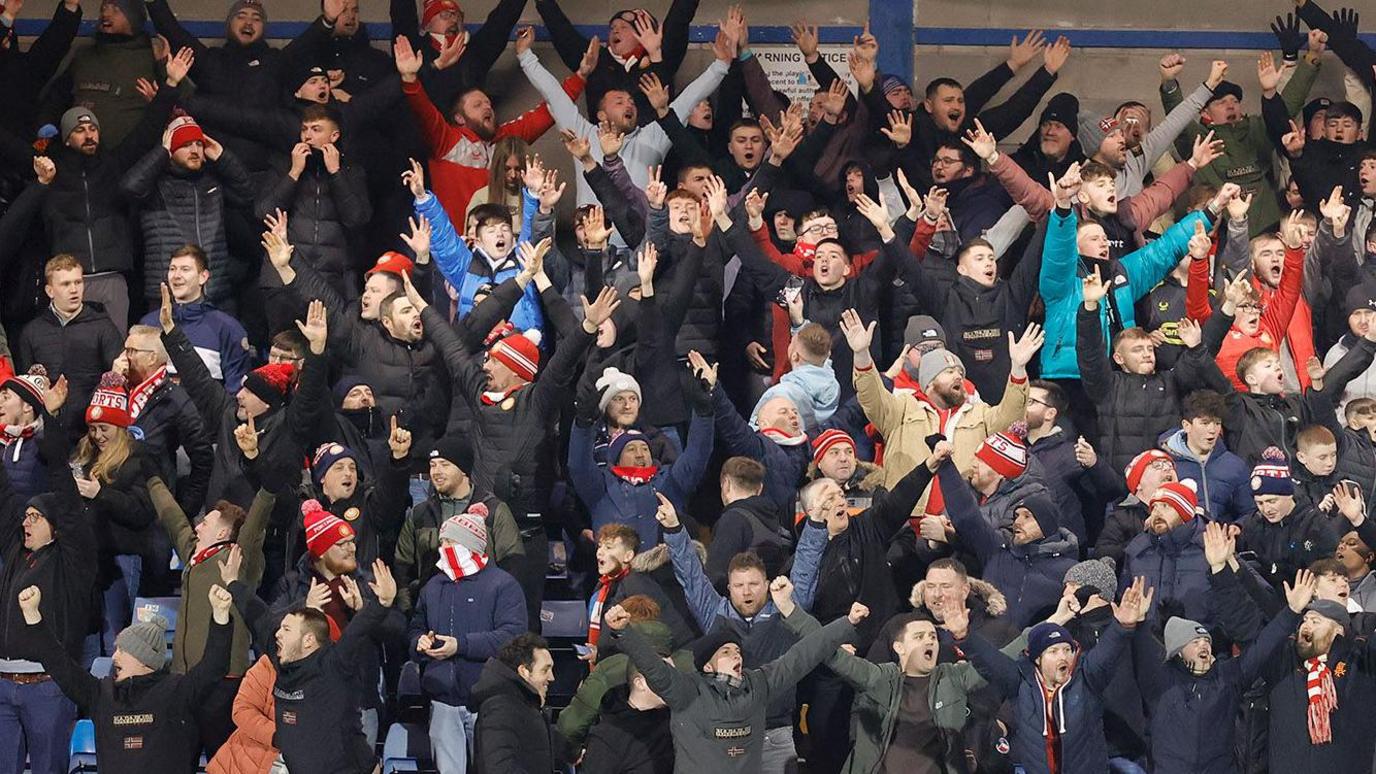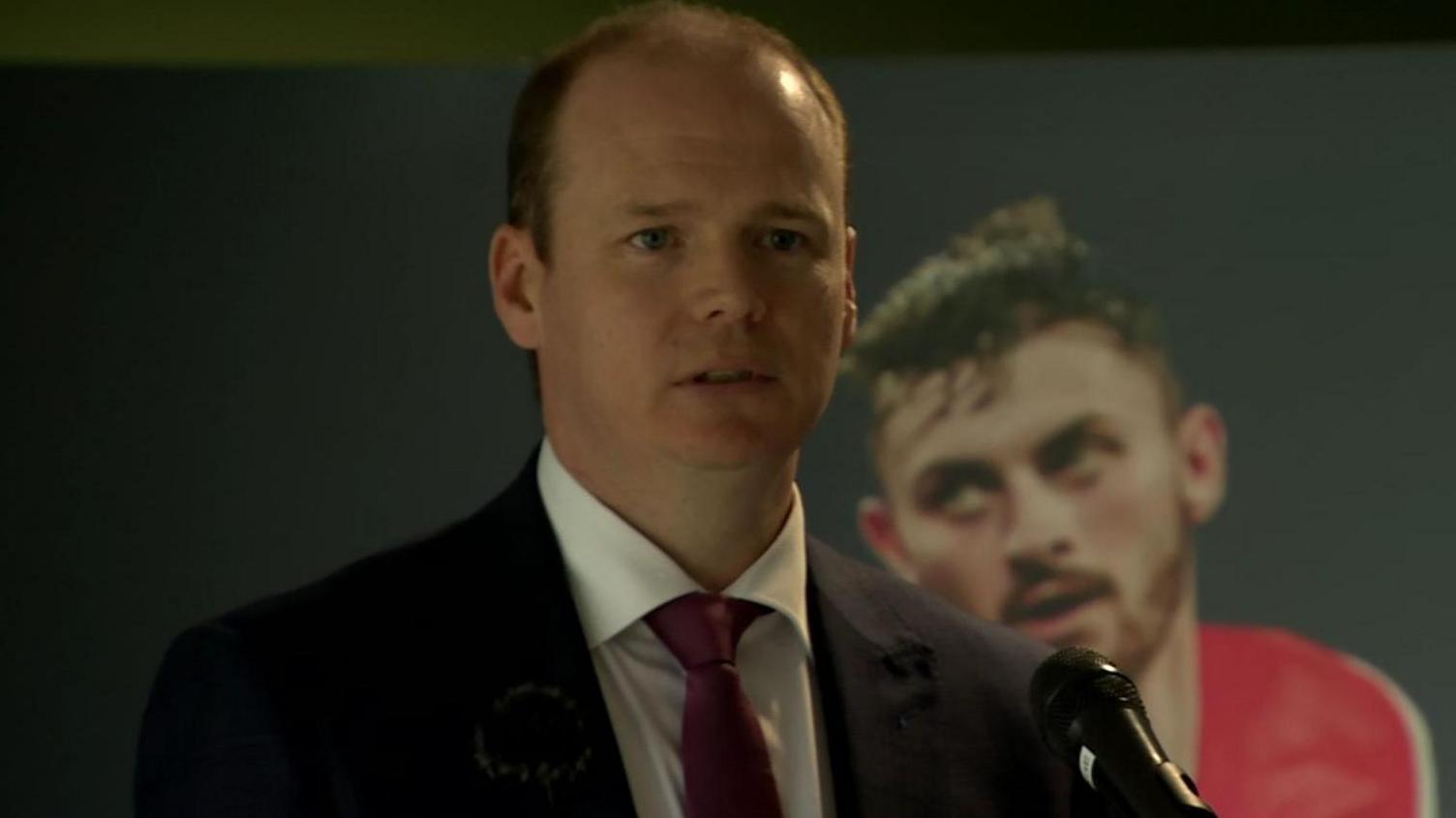NI football grounds score £36m funding

Glentoran, Cliftonville and Coleraine are among the teams hoping for financial help
- Published
Long-awaited funding of more than £36m has been announced for football grounds in Northern Ireland.
Communities Minister Gordon Lyons has also pledged cash for grassroots football and a national training centre.
A large share of the money is expected to be allocated to clubs in the top tiers of local football, with Glentoran, Cliftonville and Coleraine among the teams hoping for financial help.
The £36.2m is the same amount pledged to local football more than 10 years ago, but the funding was hit by a long series of delays.

Communities Minister Gordon Lyons said he recognised the long delay for funding has been a 'source of frustration for clubs and local communities'
Addressing representatives from football clubs from across Northern Ireland at Windsor Park, the Minister set out his vision for The Northern Ireland Football Fund.
Senior clubs, councils and other governing bodies will be able to apply for funding grants and they will need to contribute financially too.
Mr Lyons said this funding was designed to change the face of football in Northern Ireland and a "once in a lifetime opportunity to transform the game locally."
"For players at performance and grassroots level I want to see better facilities. I want to see improved accessibility for disadvantaged and underrepresented groups, both as participants and supporters," the Minister said.
The club investment strand will open for applications this financial year and first funding awards to grassroots clubs will also begin roll out.
The Minister added: “I expect the first projects to receive letters of offer from my department within this financial year and to start spending their award in the 2025/ 2026 financial year. This will begin a rolling programme of awards and project delivery.
“Work is progressing at pace on a National Training Centre for Football to host elite training for our national men’s, women’s and youth teams and to drive skills for people involved at all levels of the game. I will be saying more on this in coming weeks.”
Stadium cash announcement expected in 'coming days'
- Published20 May 2024
Football clubs welcome stadium funding comments
- Published14 February 2024
On Monday, Mr Lyons said substantially more than the £36m originally promised is now needed.
He told assembly members: “This is a start, this £36.2m. I want to see it dispersed soon, but it's not the height of our ambition."
The £36.2m will be allocated to clubs through an application scheme, with money being handed out from April next year.
How much has been spent on stadiums in Northern Ireland?
Originally known as the “sub-regional stadia programme for soccer”, the project dates back to March 2011 and was supposed to be completed by March 2018.
It was part of a package of measures aimed at redeveloping sports facilities in Northern Ireland, which was first announced in 2011.
Ravenhill rugby stadium, Windsor Park football ground and Casement Park GAA stadium were included in the list of sports grounds due for improvements, while £36m was pledged to "sub-regional stadia" or grounds used by local football clubs.
Many of these are grounds are in urgent need of redevelopment but the sub-regional money was never released, delayed by inaction and the repeated collapse of Northern Ireland's power-sharing government.
Meanwhile, the rugby and football grounds have been redeveloped but the Casement Park rebuilding project has stalled. Hopes that the stadium will be ready for Euro 2028 - for which it is earmarked as Northern Ireland's sole venue - are fading.
Estimates suggest that the final cost for Casement Park could exceed £300m.
The deadline for completion of the project for the Euros is June 2027.
Even if funding can be secured - and to date, it has not been found - there is a race against time to meet that deadline.
Nonetheless, the GAA remains committed to the redevelopment, even if it will not be ready for the Euros.
Clearance work began at the site earlier this year to prepare it for the planned construction of a proposed 30,000-plus capacity stadium.
Officials from the European football governing body, UEFA, are in Dublin on Wednesday for the Europa League final.